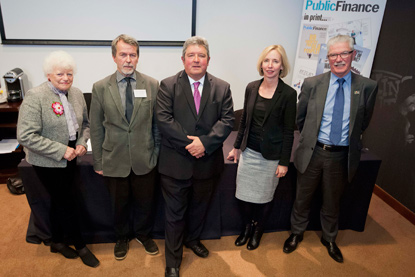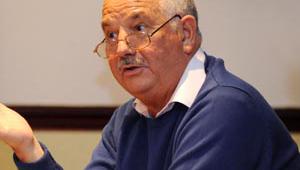By Keith Aitken in Glasgow | 20 January 2014
A vote for independence would require Scotland’s 32 councils to be given more autonomy too, their finance directors agreed at PF’s recent dinner debate.

Scotland’s municipal heads of finance believe that local authorities will need extra powers and greater autonomy if the country votes for independence in September’s referendum.
They voted by an eight-to-one margin in favour of additional powers after a lively discussion at the annual Public Finance debate in Glasgow, amid warnings that the council tax freeze was eroding local democracy.
Columnist Ruth Wishart, who served on the Christie Commission on public service reform, summarised the mood when she said: ‘I want a Scotland where local democracy isn’t greeted with such consummate indifference by the electorate. What the people are saying is that local authorities are not making enough of a difference.’
Glasgow council chief executive George Black went further. ‘Irrespective of whether the vote is for independence or not, everybody in local government would be looking for more powers and incentives to be devolved to local level,’ he said.
The debate, sponsored by Northern Trust, also heard concerns about the future of the Barnett Formula for distributing public spending; calls for power to be devolved beyond councils to communities; predictions f continuing reform in local service delivery; and fears of political instability if Scots vote against independence.
Wishart and Black were joined on the expert panel by Scotland’s Auditor General, Caroline Gardner, and Queen Margaret University Professor of Management Richard Kerley.
Delegates held a card vote on a question from Ian Lorimer, chair of the Directors of Finance Group for Scotland, as to whether councils would need further powers and greater autonomy in the event of a Yes vote. The result was 23 to three in the affirmative.
Black, stressing his view that the need to restore powers was there regardless of the referendum, predicted that a Yes vote might push along the agenda for restoring powers, while Gardner thought there were cultural barriers to innovation that councils could already be eradicating.
Kerley agreed that some councils made insufficient use of existing powers, though he supported increased autonomy regardless of the vote, while Wishart said that an anomaly was that most Scots consistently expressed a preference for ‘devo max’, increased devolution within the UK, but that option had not been allowed on to the ballot paper.
Black complained at a lack of reliable information on the implications of independence for council finances, especially on whether the council tax freeze would give way to repatriation of fiscal discretion.
Gardner judged it unlikely that either referendum outcome would impact greatly on the need for austerity, since the fiscal outlook was tight up to 2020, while Kerley thought it possible that a pro-independence vote might give councils ‘more headroom space’.
‘Independence might stop the power flow from local government,’ Kerley said. ‘On the other hand, any change is likely to be extremely costly. We don’t know what the costs will be exactly, but they will put pressure on pre-existing public services.’
Wishart argued that it was likely that the Barnett Formula would disappear, regardless of the vote. She also hoped relations between councils and Holyrood would improve in the event of a Yes vote.
‘I suspect that, if there were a No vote, Scotland would slip off [Westminster’s] radar quite quickly. As far as local government is concerned, I suspect that national government in Scotland would be dealing with an ever-tighter budget without any increase in its borrowing capabilities,’ she said.
In answer to a question from the audience, she said she hoped a ‘robust’ relationship would emerge post-referendum between Edinburgh and London. The referendum campaign, she said, had been dispiriting: ‘A lot of civil servants have been beavering away in Whitehall to come up with a weekly scare story about independence.’
Kerley thought a No vote might settle relationships across the UK. Unveiling a concept he called ‘emergent quasi-judicial federalism’, he said that Wales was now winning the sort of powers for which Scotland had fought, and Northern Ireland too increasingly embraced the devolution principle.
‘I don’t think the SNP government will implode if there’s a No vote. Remember, we have two budget cycles and a UK general election before the next Scottish Parliament election. Some of the Scottish Government might even take a scorched earth view – we’re going to do things and blame the consequences on the Westminster government and the Barnett Formula,’ Kerley said.
Gardner was less sanguine. ‘I think we would be entering into a period of instability. Things currently being held together, like the council tax freeze, could become very unstable,’ she said. Similarly, the new Scotland Act powers, the deepening welfare cuts and issues like school closures could prove disruptive: ‘There is a reluctance to take tough decisions at the moment.’
Black anticipated a calming influence from a long cycle of elections – EU, Westminster, councils, Holyrood – for which parties would want to show discipline. ‘The implications would depend on the size of the majority. If there was a slim Yes vote, the UK government would play a harder game in the negotiations: if there was a narrow No vote, the Scottish Government might feel that this strengthened their hand to press for more devolution.
‘Whatever the outcome, I think the Barnett Formula will be up for review, and that can only be a worry for Scotland.’
Kerley called Barnett a ‘fudge’ that should be replaced with a proper needs assessment. From the audience, Derek Yule, finance director at Highland Council, was concerned that a No vote could hasten the formula’s demise, while North Ayrshire chief executive Elma Murray asked whether the referendum outcome would affect the pace or scale of public service reform.
Kerley thought not, but Gardner believed the debate had already progressed matters: ‘It’s given us the opportunity to think about the sort of Scotland we want and the sort of public services we want.’
Black suggested that a Yes vote might distract from reform, whereas a No would initiate a cycle of devolution that should focus on subsidiarity. The audience, on a show of hands, thought the referendum outcome would affect the momentum of service reform.
Asked about their long-term vision for local government, the panel showed a strong disinclination to contemplate early structural reform. Gardner said: ‘There is a broad consensus that we need to do something about the finances first, because the council tax freeze won’t last forever,’ while Black said the number of councils should be appropriate to local needs: ‘We shouldn’t be pushing for uniform answers.’





















